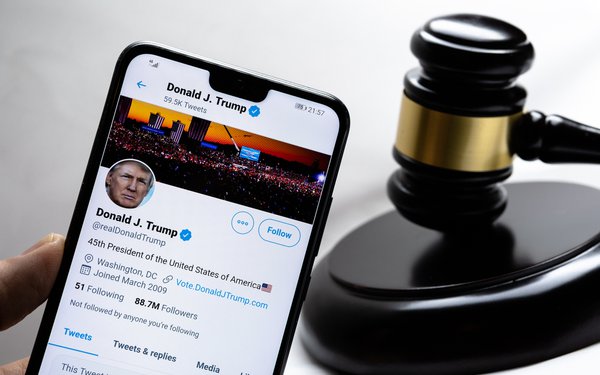
Donald Trump is no longer president, and can no longer
tweet from his @realDonaldTrump account, but a legal battle over his use of Twitter could still reach the Supreme Court.
On the last full day of Trump's presidency, the Department of
Justice urged the Supreme Court to vacate a lower court's ruling that he violated the First Amendment by blocking critics on Twitter.
In papers submitted by acting solicitor general Jeffrey
Wall, the Justice Department argued that even though Trump was voted out of office, the lower court's decision against him could have an impact on other lawmakers.
“Allowing the decision
below to stand would be harmful, no longer to President Trump, but to the Presidency itself and to other governmental officials,” the Justice Department wrote.
The battle over Trump's
Twitter account dates to 2017, when the Knight First Amendment Institute at Columbia University sued Trump on behalf of seven critics who were blocked by him on Twitter.
advertisement
advertisement
The organization said
the blocks violated users' free speech rights, arguing that Trump's Twitter account was a public forum -- comparable to city streets, parks and other places where the government can't censor people
based on their opinions.
U.S. District Court Judge Naomi Reice Buchwald in New York agreed with the Knight Institute and ruled that Trump acted unconstitutionally by blocking social media
users based on their viewpoints.
The Justice Department then appealed to the 2nd Circuit, arguing that Trump acts in a “personal” capacity, as opposed to an official one, when he
blocks people on Twitter. The First Amendment prohibits the government -- but not private individuals -- from censoring criticism.
In 2019, the appellate court rejected the White House's
position, ruling that evidence of the account's official nature was “overwhelming.”
The panel judges noted that since becoming president, Trump used the account almost daily to
talk about his administration -- including to announce new policies and changes in the cabinet.
The Justice Department then sought review by the Supreme Court. That court hasn't yet said
whether it will take up the case.
This week, the Justice Department said in supplemental papers that the dispute over Trump's Twitter account is now moot, given that he is no longer the
president.
But the government argued that the court should still vacate the 2nd Circuit's decision, stating that parts of the ruling are “deeply problematic.”
The Justice
Department added that the appellate court's ruling “blurs the lines between governmental and personal actions,” and “exposes federal and state employees to constitutional liability
when using their own personal property to speak about their jobs.”
Earlier this month, Knight Institute executive director Jameel Jaffer stated that Twitter's decision to permanently ban
Trump “effectively moots” the legal case.
Knight senior staff attorney Katie Fallow says the institute plans to file papers this week opposing the government's request.
“We agree that the case is moot now, but we do not think that the 2nd Circuit's decision should be vacated,” she says.
She adds that the 2nd Circuit isn't the only court that
has said government officials can violate the First Amendment by blocking social media users.
"This decision is not the only decision reaching the conclusion that public officials who use
social media accounts may be bound by the First Amendment, if they use the accounts for official purposes," she says.